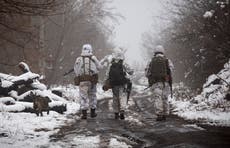People say Ukraine will never recover. They’re wrong
From Bakhmut to Mariupol entire cityscapes have been devastated. But history also tells us that a durable peace is much likelier where planning for recovery begins early, writes Patrick Watt, chief executive of Christian Aid


As Ukraine’s armed forces fight to reclaim territory from Russian invaders, the recovery conference in London this week might feel at best premature and at worst misplaced.
As the disaster of the Nova Kakhovka dam horrifyingly illustrates, the destruction of Ukraine is gearing up and adding daily to the toll of human suffering. Yet history also tells us that a durable peace is much likelier where planning for recovery begins early – before the guns fall silent and a political settlement is reached.
When the war ends, Ukraine’s reconstruction needs will be on a scale unlike anything seen in Europe since 1945. On the first anniversary of the war, the reconstruction and recovery bill was estimated at more than $400 billion. It will have risen significantly since. Indeed, the economy has shrunk by one-third, plunging millions of Ukrainians into poverty.
A huge amount of physical repair and rebuilding will be needed. From Bakhmut to Mariupol entire cityscapes have been devastated. The London Ukraine Recovery Conference will rightly place a lot of attention on the steel and concrete – along with the money – needed for reconstruction. Without this investment, private sector activity cannot rebound, nor the jobs created that will draw refugees home, and give people an economic stake in peace.
Yet there is a real danger that the London conference downplays the equally urgent need to invest in the software of recovery.
The scale of the trauma experienced by people is difficult to overstate. Earlier this year in Odessa I met Olga, a woman in her seventies from Mariupol. She and her family were living in a cramped single room on the sixth floor of a Soviet-era block of flats. Olga’s description of the siege conditions is echoed in the experience of millions of Ukrainians forced from their homes in the east of the country: freezing, separated from family, without electricity or water, under constant bombardment, and surviving on tins of pet food found in a neighbour’s abandoned apartment.
Repairing Ukraine’s social fabric will take time and deliberate effort. Psychosocial recovery will require investment not only in education and mental health services, and in the judicial system, but also in community initiatives that can bring people together and rebuild trust and hope in the future.
Christian Aid is supporting a mix of faith and secular community-based groups in Kherson, Mykolaiv, and Kharkiv and other regions that are strengthening the agency of affected people. Through micro-grants we can support initiatives that are identified as priorities by communities themselves – such as playgrounds, parent and child groups, community laundry facilities, and evening classes, alongside our funding of more usual humanitarian support – such as mobile health clinics.
For the most part, community-led initiatives in Ukraine – many of which emerged in the first weeks after the full-scale invasion – happened without support from Western donors and international NGOs. United Nations-led aid is usually too bureaucratically cumbersome and large-scale to reach such groups: it’s been estimated that only one per cent of aid to Ukraine has been channelled to local organisations, and a smaller share of that sum to community-level efforts. This is short-sighted.
A flourishing civil society is vital to a healthy social contract between the post-war state and Ukraine’s people; to social cohesion and broad-based political participation; and to speed up progress in tackling corruption. Community groups, including the large number of women-led groups that have sprung up since April 2022, and religious institutions have a critical role to play in building such a future.
There was rightly much conversation last July at the Ukraine recovery conference in Lugano about ensuring that, when the moment comes, reconstruction opportunities go to Ukrainian business, and are not simply captured by Western multinationals.
The same holds true for the country’s psychosocial recovery: rather than being monopolised by international actors, funding for Ukraine’s social recovery needs to be given flexible support by the international community. That is building on the thousands of positive examples of community-led activity that is already happening.
Supporting Ukrainian civil society is both the right thing to do and a smart investment in a just and lasting peace.
Patrick Watt is the chief executive officer for Christian Aid









Join our commenting forum
Join thought-provoking conversations, follow other Independent readers and see their replies
Comments